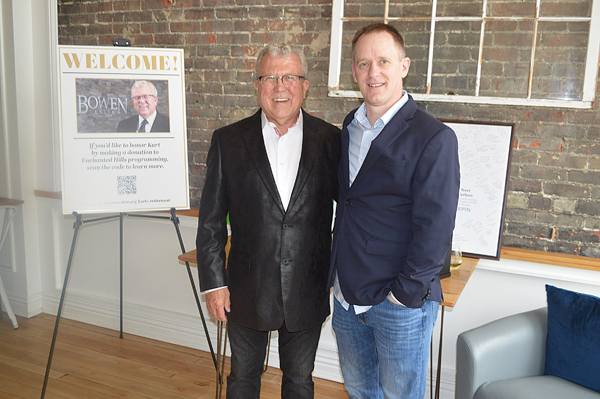Bowen Center was not in a good place over 33 years ago when Kurt Carlson took over as president and chief executive officer.
Its finances were in the red. Employees were not happy and didn’t think anyone listened to them. But just in a couple of years, Carlson was able to turn all that around and Bowen Center has grown to five counties in northeast Indiana and over 1,300 employees under his tenure.
With Carlson retiring at the end of June, it’ll be up to Rob Ryan to steer the ship going forward – an opportunity he’s been preparing for over the last five years.
During his retirement celebration open house on Saturday at The Vic at One Ten, Warsaw, Carlson talked about his experience overseeing the Bowen Center for the last 33 years.
“I was recruited into Fort Wayne Park Center to put a child adolescent division together, and I did that and brought in some new techniques, some new services and the state really liked that so they asked me to go around and do presentations in strategic locations across the state,” he recalled about how he ended up being the CEO for Bowen. “Well, unbeknownst to me, Bowen Center over here was going bankrupt, and so the board finally just had enough and they terminated the CEO.”
The board went on a search for a new CEO.
“Well, the Division of Mental Health, again unbeknownst to me, heard about it, contacted them and said, ‘You need to reach out to this Carlson guy. He might be a good answer for you.’ So they contacted me. I was one of many who interviewed,” he said. Carlson was selected for the job.
“I realized how bad things were when I was at a board meeting a month before I was supposed to start and the room was filled with staff and I thought they were here to see me. No. The physician, the head of the medical staff, got up and said, ‘I want to be heard.’ And the board chair said, ‘No, doctor, you have to wait your turn. You’re on the agenda.’ He said, ‘Well, if you won’t listen to me, we resign,’” Carlson stated.
Half of the room – all the nurses and doctors – walked out of the room and resigned. Carlson realized immediately that that wasn’t good.
The Joint Commission is the accreditation organization that all mental health centers, who have an inpatient unit, have to be accredited by. They provide accreditation for hospitals and psychiatric facilities. The woman at the time who was in charge of quality improvement also was in charge of the survey. She announced to the board at the same meeting that the Bowen Center had “massively failed” Joint Commission.
Carlson had been a consultant for Joint Commission in the past, so he knew how to fix everything that was broke, but he wasn’t going to be able to snap his fingers to fix it. He knew he had a lot of work to do.
A week later, Carlson received a call from the board chairman who told him they needed him to come meet with the bankers because they didn’t have enough money to make payroll. They needed Carlson to convince the bankers to give the Bowen Center a loan.
Two days later, the night before Carlson was to meet with the bankers, he put together The Phoenix Plan. When he presented it to the bankers, they were “very impressed,” he said, and they decided to give the new guy a chance. They asked Carlson if the plan was a national model to turn a business around. No, he said, he just came up with it the night before.
“Fortunately, it worked. So it took 2-1/2 years to get it into the black. Everybody wanted to do the right thing, they just didn’t know what the right thing was,” Carlson said. “And so, the real problem was, all mental health centers were started on grant funding.”
First, it was construction grants; then staffing grants; then operations grants.
“Well, the leadership of the Center was not even paying attention that grants were the history and fee-for-service is the future, and they didn’t know how to make that happen because they never lived in that world and I had. So, I could see where the major problem was and that we just needed to make sure that the staff were productive, we get the bills out the door and we collect the money in order to pay the bills. So, it took 2-1/2 years to do that. We’ve been growing ever since,” Carlson said.
Bowen Center now has 1,500 positions, but like everyone else it is “starved for staff,” he said, so it currently has 1,300-1,400 employees.
“We’ve grown dramatically. And now we’re into integrated care with our federally qualified health clinic, so lately, my job has been to acquire real estate in strategic locations in our five core counties and I’m closing in on that. I’ll have those all done by the end of June, so that when they get around to building the buildings, they’ll have the premiere place in each of those counties to build them,” Carlson said.
Bowen Center’s corporate office is in Kosciusko County, but Bowen Center also has facilities in Whitley, Huntington, Wabash and Marshall counties.
‘Right Person For The Job’
Carlson’s second 10-year contract was set to expire this February.
“And I thought, ‘You know, we probably need to start looking for somebody who can succeed me at the end of the 10-year contract. And so Rob Ryan and I, when managed care came to Indiana, I was meeting with the insurance companies, trying to establish that relationship with mental health centers. And so, (Ryan) was curious about it so I would bring him with me and I began to realize, ‘This guy has a lot of talent. Very bright. He learns quick. He understands a business,’” Carlson said.
So over the last five years Carlson has done whatever he could to show Ryan how he runs things.
“He will do it differently, better in many ways, and it’ll be different in other ways, and so he is the right person for the job,” Carlson stated.
Ryan said he started at the Bowen Center in 2004.
“We were a lot smaller then. We were all in one building, here in Kosciusko, so I probably met (Carlson) one of the first few days that I worked there back in 2004,” Ryan said. “I came to Bowen Center as an intern, and so I thought to myself, ‘You can do this for a year.’ And here we are 17 years later and I’m still here. They treated me well. Honestly, we try to treat all of our staff well.”
Ryan said him taking over as CEO has been a five-year transition. The position was opened up for anyone who wanted to interview, and that included Ryan.
“Him and I had conversations before that of what we wanted to do, but we still wanted to make it a fair process. So we talked about it, mostly we talked about it over the last five years,” Ryan said.
He said Carlson’s legacy is well established.
“So, what’s next, what I really appreciate about him is, instead of saying, ‘No, no, you can do that when you’re in charge,’ he’s really helped me over the last five years” get a lot of things started, Ryan said.
Everyone knows Bowen Center for mental health, he said, “but to try and turn that corner and say, ‘Hey, we also do physical health’ and the reasons behind that, he’s been able to help with that so I appreciate that.”
Ryan said there won’t be a big difference between Carlson’s last day on June 30 and his first day on July 1.
“He really has stepped back enough that there’s not really going to be any difference. By now, honestly, he’s allowed the day-to-day operations to come to me for several years, so he’s been really good that way,” Ryan said.
Recruiting
One of the early challenges Carlson faced over his 396 months as CEO included recruiting medical staff.
“So the more we grow, the more patients we see who need medication management. Diagnosis for whatever, maybe disability, things like that. And so, Ron Clark … he worked for me at Park Center. I brought him over. His wife, I brought her over. … I put him in charge of my inpatient unit because you need a psychiatrist for that. And so, we jointly recruited psychiatrists. That was a challenge,” Carlson said.
Ron Clark, retired vice president of rehab and recovery, essentially ran all the medical services, nursing, groups homes, the in-patient unit and anything else that had to do with rehabilitation. He also wrote a lot of the grants and programs for Carlson.
He and Carlson started working together around 1984 at Park Center. Clark said he was willing to join Carlson at Bowen Center because, “Kurt is one of those rare individuals that has no hidden agendas. What he says is what he’s going to do and when he tells you something, he means it. That’s rare in our world. He always lets his vice presidents create. So if we see an opportunity that would help the public or help with mental (illness), we were allowed to go for it. Set up a budget and see what we could do. For the most part, I think it was very successful that way.”
He said he couldn’t have asked for a better CEO, ever, and he’s worked for a few of them.
“He is a genuine one-of-a-kind. He really is,” Clark said.
Shannon Hannon, who is the vice president of integrated care, doesn’t have to recruit anymore, Carlson said, as they’re contacting her for career opportunities.
He said they had a nurse practitioner call and said the place she was working for doesn’t listen to her and she heard Bowen Center listens to its staff. She was interviewed and was “absolutely wonderful,” Carlson said.
There’s a dentist that wants to come work for Bowen Center. Another nurse practitioner decided she wanted to come work for the Bowen Center after she was told by her previous place of employment that she should stop seeing a patient because the patient didn’t have a pay source.
“We don’t even have to recruit, but that was a challenge earlier on. It’s a rural area, and now it’s not as much of a challenge. Now it’s just a matter of making sure we treat them well so they stay with us,” Carlson said.
Bowen Center doesn’t have a non-compete clause “because I want them to want to work for me,” he said.
A Clinician’s Heart
Carlson said he’s never lost his clinician’s heart.
“The reason I do what I do is for the people we’re here to serve, and I think that the staff are aware that I’m very mission-based, because, again, I was there seeing patients. While I can only see so many patients an hour, a day, a week, a month, a year, if I have 1,500 staff, that’s a lot more people that I can cause to get served,” Carlson said.
Absolutely, he said, he’s going to miss his job once he’s fully retired.
“This has been difficult,” he said. “… But it’s a necessity. I’ve given up the supervision and all that because if I’m doing it, they’re not learning.”
He’ll still be on a consulting contract with the Bowen Center for a year or so as he’s needed.
“It’s tough to give up which I’ve done for 49 years,” Carlson said.
He has felt the support back from the community. He received the Man of the Year award at the Kosciusko Chamber of Commerce in January, among other recognitions.
“I very much feel appreciated,” Carlson said. “I just talked with Avis Gunter. She’s a mainstay of this community. The kind words she had, that’s very meaningful to me. So, yes, I do appreciate the acknowledgement.”
He said it’s been a privilege to serve.
“It’s hard to hear when other mental health centers, who could be doing the same thing we are, actually turning patients away, saying ‘we don’t do that service,’ putting limits on the number of people they serve. That’s why we’re growing, it’s because if the community needs us, then we should be providing that service. And even with all that, we still can’t get it all for everybody,” Carlson said.
He said it was like when the Bowen Center opened the methadone clinic in Fort Wayne.
“The state had put a stop on any new methadone clinics because they were all being run by for-profit organizations and they would just keep a patient forever, as it was profit. And so the state – the legislation – decided we need to allow five more licenses out there, but it has to be mental health centers,” Carlson said.
He did a tentative application just to get Bowen Center’s name in, and then he visited every single methadone clinic around the state. Some of them are abysmal, he said, while others look nice. Watching who went in and out at one particular southern clinic, he began to notice people with strollers.
“At first I was appalled, then I realized, ‘That clinic is returning those parents to those children and to the family and to the workforce.’ That’s all I needed because I was convinced because, as you know, methadone is controversial and it’s a replacement (drug),” Carlson said.
When Dr. Carolyn Warner-Greer, an addiction medicine physician and the medical director at the Bowen Recovery Center, who also works at the Bowen outpatient offices doing outpatient psychiatry, joined the Bowen Center, so did her husband, Dr. Gerald Greer, a primary care physician at the Bowen Health Clinic.
Recalling when she met Carlson, Warner-Greer said, “It was eclectic. Kurt’s mission was addiction recovery in like 2016-17. We just happen to cross (paths) in a conference, not anywhere around here, and we always kind of kept each other’s names in the background. So when he wanted to open the Bowen Recovery Center, which is our opioid treatment program, he reached out. I said, ‘Kurt, there’s one opening in Lafayette, which is really close to my house, and then Fort Wayne is 2-1/2 hours away.’ But, he was persistent and then we met his (corporate) team now. That was back in 2017.”
Gerald said at about the same time, Bowen Center was opening primary care integrated health clinics, the timing was right and they offered him a position at one of the Fort Wayne clinics. His wife was already there, and he knew she loved her job and wasn’t going anywhere, he’s originally from Fort Wayne and he liked all the people he met at Bowen Center so he joined in 2020 and helped open the clinic on Rudisill Drive in Fort Wayne.
“Kurt knows, first of all, he knows everybody. And then we have a thing where we go to Kurt if we need something ‘unstuck.’ So, he definitely fosters independence from everybody who works with him, however, there’s some times where we’re just like, ‘I don’t know how to get this.’ And he knows a name. He knows a person. He has a situation that is similar. And that won’t stop. He can retire, but unless he changes his cell phone, I know where to find him,” Warner-Greer said.
Gerald said Carlson’s passion for what the Bowen Center is doing is “immeasurable.” That has trickled down to the people following in his footsteps and Gerald said he knows that will carry on.
“We’re serving a purpose that is not being met otherwise in a lot of cases,” Gerald said. “We’re filling in a lot of gaps in health care and helping a lot of people that feel marginalized or less than, and let them know that you have a right to have health care just like anybody else. And you don’t have to feel like you’re being judged. We’re just here to take care of you and help you,” he said.
The Future
For Carlson, Bowen Center is all about the people and its staff. Many of his executives at the top have been with Bowen for 20-30 years.
“A lot of stability at the top. We work well together. I really value them and I make sure they understand that. We don’t always agree, but eventually, we get to the same point of this is a good service that creates value and gets some things done. So it’s been a good, collaborative, cohesive working relationship,” Carlson said.
As for what he hopes for Bowen Center’s future, he said, “Continue to grow.”
Bowen Center is doing integrated care. Eventually, they’re going to bring in dental care. “I don’t see any ceiling for the Center,” he said. “I think it’s just going to grow.”
Ryan said, “For one, stability was important for Kurt and I, that’s why the five-year transition was important. Who we are today should be a reflection of who we’re going to be in five years. But you should also look back and recognize those 10 years apart – five years in the transition and five years ahead. So the things that made us well-known about helping anyone no matter whether or not you can pay for (it), making sure that if you have a mental health issue, that you’ll be accepted and won’t be judged – those all won’t change.”
The additional piece, he said, is that Bowen Center has been trying to add physical health because, “The quick story that I’ve had is, we have a lot of people that have serious mental illness that they basically have no family, probably have lived with us, we care for them 24/7. And I’ve watched them get older, have chronic diseases and they’re dying in their 60s, maybe later 60s. And you look at that, that the average life span for Americans is 80, and you think, ‘What’s going on?’ So when we dug into that deeper, mental illness has a lot of side effects – the medications, it often goes along with poverty, they often don’t have access to food, there’s often knowledge gaps.”
He said one of the committents that Bowen Center has made in the next five years is to make sure that not only do people live with as few side effects to the mental side of mental illness, but also to live full lives until they’re 80.
The other things Bowen Center will be adding are dental and opthalmology care.
“If you have Medicaid or can’t afford insurance for dentistry, try and find a dentist. They’re just not around. So what happens? You wait until it gets abscessed, you go to the emergency room and their options are to pull it out. So that’s the other commitment. It’s kind of hard to go in with pride to a job interview and feel like you’re going to do great when you’re embarrassed with your teeth. So what do you do when no one accepts Medicaid or you can’t pay out of pocket? So that’s the other thing that we really want to add. It’s, again, quality-of-life issues that we’re really going to try to focus on in the next five years,” Ryan said.
The five areas that Bowen Center focuses on are ones that the federal government has identified as quality-of-life issues. Ryan said they’re never interested in becoming a surgical center or a hospital because there’s already great options for that.
“It’s that preventive care, that basic care that’s just jam-packed that won’t take or can’t take Medicaid. So, for us, it would be mental health and psychiatry, therapy – which we’ve always done, pharmacy, dentistry, opthalmology and, of course, physical health,” Ryan said. “So no plans beyond those five, six things.”
No matter what services Bowen Center offers, Ryan said Carlson has always put Bowen Center first and he will do the same.
“And I think somebody who runs a company or who is a leader has to do what they ask their people to do. And we have tough jobs. Working with people who have mental illnesses has its challenges. The world, in a lot of ways, doesn’t value that job. You don’t get paid a lot to do that, you don’t often get support for that,” Ryan said. “But to him, that’s never mattered. So if it means long hours or doing the tough job, he is the first to do it. So that’s easy then to ask for staff to do it because he’s done it, and, certainly, I’ve tried to adopt that – the first one to the office, the last one to leave.”
He said the other thing that is important is that Bowen Center is a passion for Carlson.
“Mental illness is one of those things that has touched most of all of our lives, but it certainly has his, has mine, so when we see a person with mental illness, we see a family member, a loved one, not somebody who needs our charity or somebody who is like ‘well, they’re not worth it, but I’ll lower myself to them.’ They see a family member, somebody that we love and care for, somebody that has value, regardless of whether or not they get help. And I think that’s the other thing: Just the humanity of what Kurt brings to things is something that I’ve always been impressed with,” Ryan said.





